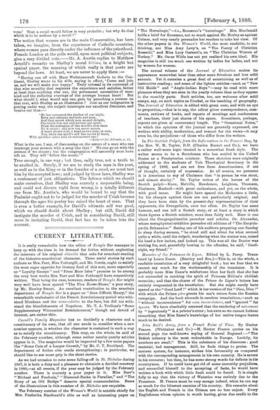a rather well-worn topic treated in a somewhat fresh style.
The writer seems to be a Scotchman who has settled in the United States as a Presbyterian minister. These sketches were originally addressed to the students of Yale Theological Seminary in the spring of 1886, and are not free from Americanisms, if not of thought, certainly of expression. At all events, we presume it is American to say of Chalmers that "in person he was stout, and almost stocky." Dr. Taylor writes of the heroes of the Scotch pulpit—Knox, Melville, Henderson, Leighton, Thomson, Chalmers, Macleod—with great enthusiasm, and yet, on the whole, with good sense. He might have spared the Moderates a little, for his charges against them are not particularly original, and they have been slain by the present-day representatives of their opponents, the Evangelicals, once too often. Dr. Taylor has some humour, and can tell a Scotch story, or at least a story in which there figures a Scotch minister, more than fairly well. Here is one
about the Congregationalist preacher and scholar, Dr. Alexander, whose metaphysical erudition pervades old editions of "The Encyclo-
predia Britannica." Seeing one of his auditors preparing one Sunday to sleep during sermon, "he stood still and silent for what seemed quite a while, until the culprit, wondering what the matter was, raised his head a few inches, and looked up. This was all the Doctor was waiting for, and, gracefully bowing to the offender, he said, ` Good- night, my friend.'"


































 Previous page
Previous page